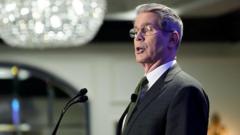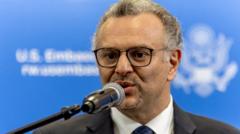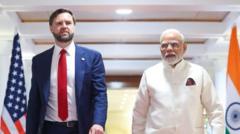Scott Bessent, the US Treasury Secretary, emphasized a pivotal chance to negotiate a substantial trade deal with China, contingent on Beijing's willingness to transform its economy away from export dependency. Amid rising trade tensions marked by harsh tariffs from both nations, Bessent articulated a vision for a cooperative path forward that benefits both economies.
Opportunity for a Transformative US-China Trade Agreement, Says Bessent

Opportunity for a Transformative US-China Trade Agreement, Says Bessent
America's Treasury Secretary highlights potential for significant trade agreement amid escalating tensions.
In a recent statement, Treasury Secretary Scott Bessent underscored a critical opportunity for a major trade agreement between the United States and China, contingent on China's seriousness about moving away from a manufacturing export-based economy. During a discussion at the International Monetary Fund (IMF) conference, Bessent asserted that while the ongoing trade war has intensified, a concerted effort could yield mutually beneficial outcomes.
Bessent remarked, "China needs to change. The country knows it needs to change. Everyone knows it needs to change. We want to help it change because we need rebalancing too." His comments reflect the urgent need for both countries to address the shifts in their economic interactions, which have rattled financial markets and created widespread uncertainty.
The backdrop of his remarks is the escalating trade conflict, where the US has instituted tariffs reaching 145% on various Chinese goods, prompting China to retaliate with a 125% tariff on US imports. The Financial pressures are becoming evident as both nations navigate this tariff-laden landscape aimed at bolstering domestic manufacturing and protecting local jobs.
Bessent expressed optimism for de-escalation, indicating both nations recognize the need for economic rebalancing—moving away from over-reliance on consumption-driven growth. "If China is serious about rebalancing towards a domestic economy, then let's collaborate to achieve that," he suggested.
Beyond trade discussions, he urged the IMF and World Bank to concentrate on their fundamental missions—economic stability and development—criticizing their involvement in broader social issues like climate change and gender equality as distractions from their core objectives. With renewed focus, both institutions can play a pivotal role in fostering a stable economic environment conducive to growth for both US and Chinese economies.





















